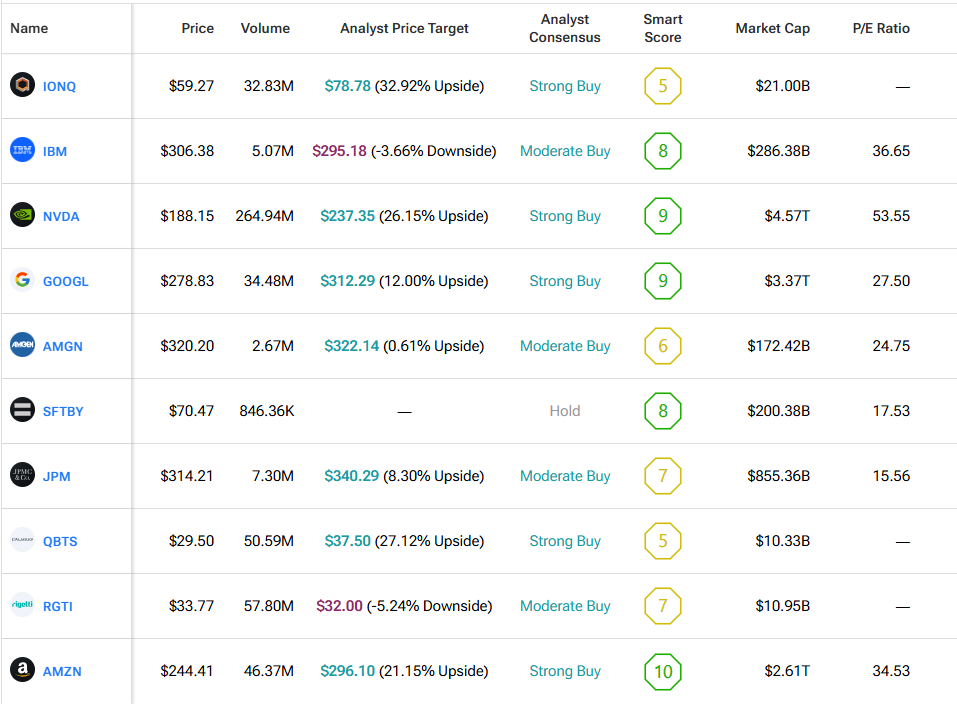Welcome to another biweekly update on all things quantum computing. This edition covers the next stage of DARPA’s national quantum push, a new high-precision system from Quantinuum, and fresh partnerships shaping the industrial future of this tech. Let’s go.
Meet Your ETF AI Analyst
- Discover how TipRanks' ETF AI Analyst can help you make smarter investment decisions
- Explore ETFs TipRanks' users love and see what insights the ETF AI Analyst reveals about the ones you follow.
DARPA Advances 11 Companies to Next Quantum Stage
First, the U.S. Defense Advanced Research Projects Agency (DARPA) has moved 11 companies into Stage B of its Quantum Benchmarking Initiative. This stage will focus on testing how each company plans to scale its system, manage risk, and build working machines.
Companies selected include Atom Computing, Diraq, IBM (IBM) , IonQ (IONQ), Nord Quantique, Photonic Inc., Quantinuum, Quantum Motion, QuEra Computing, Silicon Quantum Computing, and Xanadu.
Each company is working on a different type of quantum technology. For example, IonQ uses trapped ions while IBM builds modular superconducting systems. The goal is to find out which of these designs can lead to useful quantum computers by 2033.
DARPA is not picking a winner. Instead, it will study each path to see if it is realistic, cost-effective, and ready for real-world use. Companies that pass this stage may proceed to Stage C, where the hardware will undergo external testing.
Quantinuum Launches Helios with Record Accuracy
Next, Quantinuum has released a new system called Helios, which it says is now the most accurate commercial quantum computer. The system can perform quantum logic with more than 99.9% accuracy and runs on a new programming tool called Guppy.
Helios uses atomic ions for computing and has a new layout that lets it move these ions between memory and processing units. That reduces the number of swaps needed, cutting down on delays and errors. The machine also includes real-time classical control and supports hybrid coding using tools from Nvidia (NVDA).
Early users of Helios include JPMorgan Chase (JPM), SoftBank (SFTBY), and Amgen (AMGN). They are testing the system on problems in finance, drug discovery, and materials science. Helios is available through the cloud and can be installed on-site for direct access.
Quantinuum states that the design will continue to improve through software updates. The company also plans to add faster error correction powered by Nvidia’s Grace Hopper chips.
LG Invests in Pasqal’s Quantum Tech
LG Electronics has taken an equity stake in Pasqal, a French company that builds neutral atom quantum computers. The firms will work together to build tools that solve industrial problems such as simulation, optimization, and advanced materials.
They will also explore how to improve core quantum parts, including optical and electrical modules. These parts are used to trap and control atoms in Pasqal’s room-temperature systems.
The deal reflects a trend where large companies are teaming up with quantum startups to bring the tech closer to industrial use. Pasqal says the partnership will help speed up the move from research to market-ready products.
Quantum Machines Pushes Control Tech Forward
Quantum Machines, an Israeli Quantum start-up, has introduced new tools to control quantum computers at scale. Its flagship product, the OPX1000, is a real-time control unit that lets developers program and adjust qubits with high precision.
The company also offers a software layer called QUA, which makes it easier to write and test low-level quantum programs. These tools work with hardware from different vendors and support many types of qubits.
Quantum Machines is working with Nvidia to build a full-stack system that combines quantum and classical computing. This setup will help companies run complex hybrid tasks without slowing down. The system is designed for high-speed use in finance, chemistry, and AI.
California Backs Quantum with New State Plan
Lastly, California has launched a statewide quantum push called “Quantum California.” The plan links universities, national labs, and private firms to grow local quantum research and job creation.
It includes $4 million in state funding and follows a new law that calls for a full strategy on how to turn research into working tools. The state is already home to major labs and quantum centers, including UC Berkeley, Stanford, and the Google Quantum AI Campus (GOOGL) (GOOG).
Officials say the goal is to support long-term growth and help move new tech from campus labs to the real world. This step adds to recent U.S. efforts to stay competitive in global quantum innovation.
We used TipRanks’ Comparison Tool to line up all the tickers mentioned in the piece alongside notable quantum stocks. It’s a quick way to see how they stack up and where the field could be heading.

















